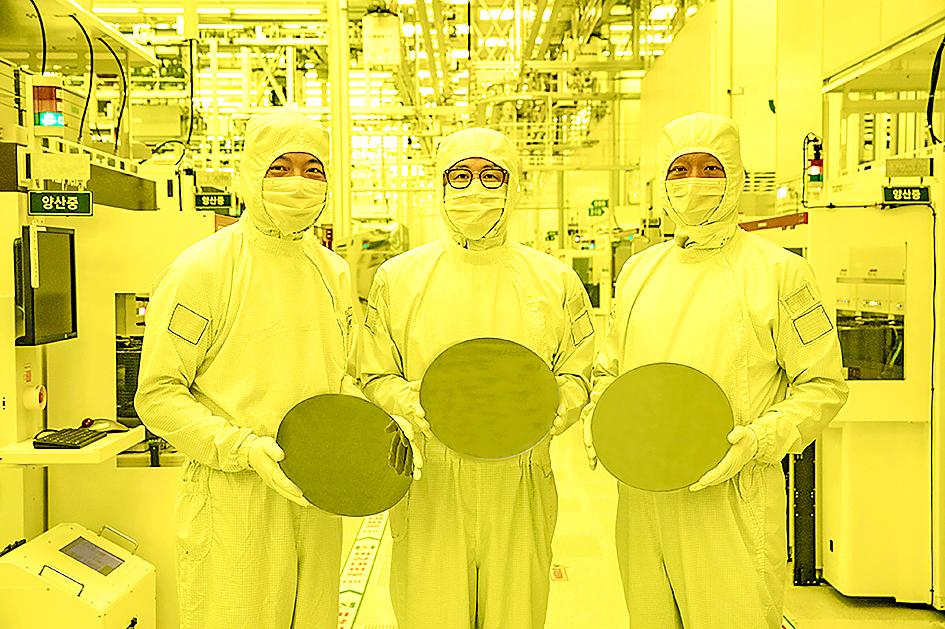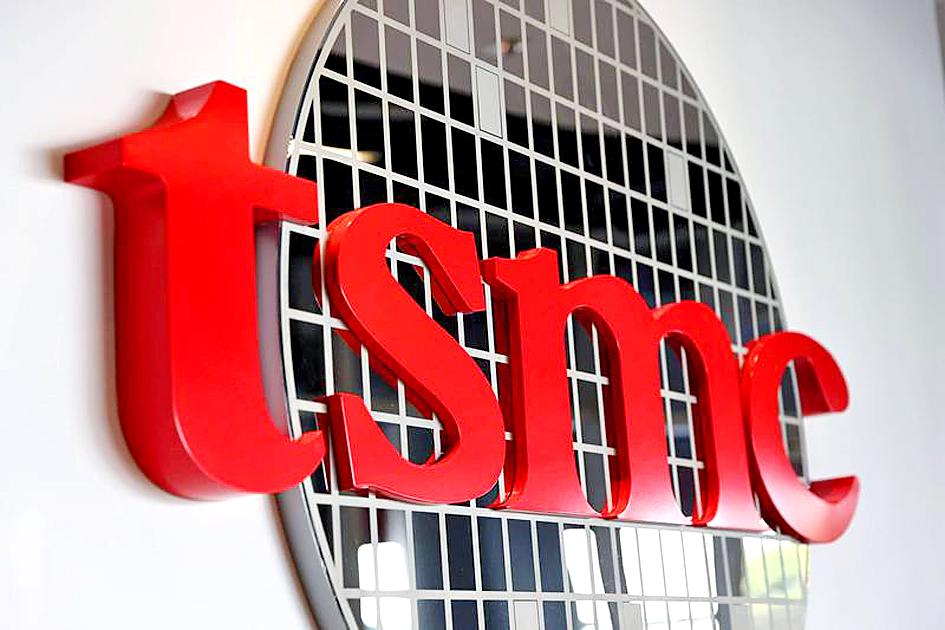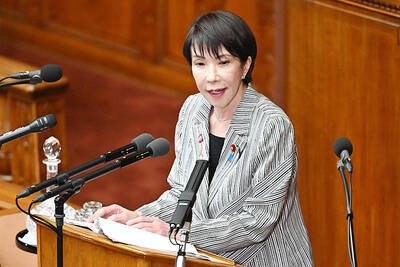Samsung Electronics Co yesterday commenced mass production of 3-nanometer chips that are more powerful and efficient than predecessors, beating rival Taiwan Semiconductor Manufacturing Co (TSMC, 台積電) to a key milestone in the race to build the most advanced chips in the world.
South Korea’s largest company said in a statement that it was beginning with 3-nanometer semiconductors for high-performance and specialized low-power computing applications before expanding to mobile processors.
By applying so-called Gate-All-Around transistor architecture, Samsung’s 3-nanometer products reduce power consumption by up to 45 percent and improve performance by 23 percent compared with 5-nanometer chips, it said.

Photo: AFP
Samsung’s push to be first to market with the latest technology is essential in its uphill climb to match TSMC, which remains dominant in the contract chipmaking market.
The Taiwanese firm accounts for more than half of the global foundry business by revenue and is the exclusive supplier of Apple Inc’s silicon processors for iPhones, iPads, MacBooks and desktop Mac PCs.
TSMC has said its 3-nanometer technology would be the most advanced technology when it is introduced in the second half of this year.

Photo: Reuters
The technology would first be used to manufacture chips for high-performance-computing applications and smartphones, it said.
TSMC also said it has seen stronger customer engagement for its 3-nanometer technology for the first year, compared with the previous-generation 5-nanometer technology.
TSMC adopts a different approach in developing its 3-nanometer technology. The company said it adopts the FinFet transistor structure to deliver the best technology maturity, performance and cost for its customers.
TSMC and Samsung are competing for large multiyear orders from the likes of Apple and Qualcomm Inc.
Samsung is producing the 3-nanometer chips at its Hwaseong facilities and is expected to extend that production to its newest Pyeongtaek fab.
“We will continue active innovation in competitive technology development and build processes that help expedite achieving maturity of technology,” said Siyoung Choi, president and head of Samsung’s foundry business.
Samsung’s launch of 3-nanometer chip production should not affect TSMC’s market share and sales growth in the next 12 months, Bloomberg Intelligence analyst Charles Shum (沈明) said.
Samsung’s 3-nanometer chip needs to demonstrate that it can be produced at the same cost-efficiency level as TSMC’s most advanced N3 process before it can gain new orders from Apple, Qualcomm and other large chip designers, Shum added.
Samsung’s advance comes at a sensitive time for the semiconductor industry, whose place in the global geopolitical order is currently under scrutiny by leading governments.
The US and China have both taken steps to bring more chipmaking capacity and expertise within their borders — arguing it is a matter of national security — and Samsung is in the process of setting up a new fabrication facility in Texas.
Additional reporting by Lisa Wang

‘SECRETS’: While saying China would not attack during his presidency, Donald Trump declined to say how Washington would respond if Beijing were to take military action US President Donald Trump said that China would not take military action against Taiwan while he is president, as the Chinese leaders “know the consequences.” Trump made the statement during an interview on CBS’ 60 Minutes program that aired on Sunday, a few days after his meeting with Chinese President Xi Jinping (習近平) in South Korea. “He [Xi] has openly said, and his people have openly said at meetings, ‘we would never do anything while President Trump is president,’ because they know the consequences,” Trump said in the interview. However, he repeatedly declined to say exactly how Washington would respond in

Japanese Prime Minister Sanae Takaichi said yesterday that China using armed force against Taiwan could constitute a "survival-threatening situation" for Japan, allowing the country to mobilize the Japanese armed forces under its security laws. Takaichi made the remarks during a parliamentary session yesterday while responding to a question about whether a "Taiwan contingency" involving a Chinese naval blockade would qualify as a "survival-threatening situation" for Japan, according to a report by Japan’s Asahi Shimbun. "If warships are used and other armed actions are involved, I believe this could constitute a survival- threatening

WARFARE: All sectors of society should recognize, unite, and collectively resist and condemn Beijing’s cross-border suppression, MAC Minister Chiu Chui-cheng said The number of Taiwanese detained because of legal affairs by Chinese authorities has tripled this year, as Beijing intensified its intimidation and division of Taiwanese by combining lawfare and cognitive warfare, the Mainland Affairs Council (MAC) said yesterday. MAC Minister Chiu Chui-cheng (邱垂正) made the statement in response to questions by Democratic Progressive Party (DPP) Legislator Puma Shen (沈柏洋) about the government’s response to counter Chinese public opinion warfare, lawfare and psychological warfare. Shen said he is also being investigated by China for promoting “Taiwanese independence.” He was referring to a report published on Tuesday last week by China’s state-run Xinhua news agency,

‘ADDITIONAL CONDITION’: Taiwan will work with like-minded countries to protect its right to participate in next year’s meeting, the foreign ministry said The US will “continue to press China for security arrangements and protocols that safeguard all participants when attending APEC meetings in China,” a US Department of State spokesperson said yesterday, after Beijing suggested that members must adhere to its “one China principle” to participate. “The United States insists on the full and equal participation of all APEC member economies — including Taiwan — consistent with APEC’s guidelines, rules and established practice, as affirmed by China in its offer to host in 2026,” the unnamed spokesperson said in response to media queries about China putting a “one China” principle condition on Taiwan’s